 An English poem is a form of literary expression written in the English language that follows a specific structure and often employs various poetic devices such as rhyme, meter, and figurative language to convey emotions, ideas, or stories. English poetry has a rich history dating back centuries, and it encompasses a wide range of styles and genres.
An English poem is a form of literary expression written in the English language that follows a specific structure and often employs various poetic devices such as rhyme, meter, and figurative language to convey emotions, ideas, or stories. English poetry has a rich history dating back centuries, and it encompasses a wide range of styles and genres.
Common elements of English poetry include:
- Rhyme: Many English poems use rhyme schemes, where words at the end of lines have similar or identical sounds. Common rhyme schemes include AABB, ABAB, and ABCB.
- Meter: Meter refers to the rhythmic pattern of stressed and unstressed syllables in a line of poetry. Common meters in English poetry include iambic pentameter (ten syllables per line with alternating stressed and unstressed syllables) and trochaic tetrameter (eight syllables per line with the stress on the first syllable).
- Figurative Language: Poets often use figurative language, such as similes, metaphors, personification, and symbolism, to convey deeper meanings and create vivid imagery.
- Stanzas: Poems are typically divided into stanzas, which are groups of lines that are separated by spaces. The number of lines in a stanza can vary.
- Themes: Poems explore a wide range of themes, including love, nature, death, beauty, social issues, and more. The theme of a poem is the central idea or message the poet wants to convey.
- Imagery: Poets use descriptive language to create imagery that appeals to the reader’s senses, allowing them to visualize and experience the poem more vividly.
- Tone: The tone of a poem refers to the attitude or emotional expression of the poet. Poems can have various tones, such as joyful, melancholic, hopeful, or angry.
English poetry has a diverse canon, including famous poets like William Shakespeare, William Wordsworth, Emily Dickinson, Robert Frost, Langston Hughes, Maya Angelou, and many others. These poets have contributed to the rich tradition of English poetry, and their works continue to be studied, appreciated, and celebrated by readers and scholars worldwide.
AFFLUENCIVE JOURNEY
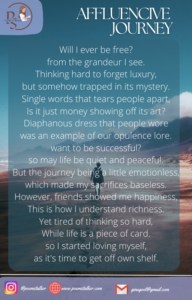
Will I ever be free?
from the grandeur I see.
Thinking hard to forget luxury,
but somehow trapped in its mystery.
Single words that tears people apart,
Is it just money showing off its art?
Diaphanous dress that people wore
was an example of our opulence lore.
want to be successful?
so may life be quiet and peaceful.
But the journey being a little emotionless,
which made my sacrifices baseless.
However, friends showed me happiness,
This is how I understand richness.
Yet tired of thinking so hard,
While life is a piece of card.
so I started loving myself,
as it’s time to get off own shelf.
WORD PROB
AFFLUENCIVE refers to a state of abundance, wealth, and prosperity.
GRANDEUR is impressive splendor or majesty.
DIAPHANOUS is lightweight, delicate.
OPULENCE is extreme wealth, luxury.
SECOND SIGHT
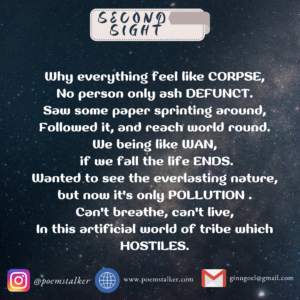
Why everything feel like CORPSE,
No person only ash DEFUNCT.
Saw some paper sprinting around,
Followed it, and reach world round.
We being like WAN,
if we fall the life ENDS.
Wanted to see the everlasting nature,
but now it’s only POLLUTION .
Can’t breathe, can’t live,
In this artificial world of tribe which HOSTILES.
WORD PROB
CORPSE : dead body
DEFUNCT : no longer in existence
WAN : pale, weak, or sickly appearance
HOSTILES : unfriendly, or opposed to each other
A thought of mind
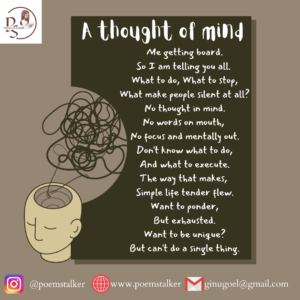
Me getting board.
So I am telling you all.
What to do, What to stop,
What make people silent at all?
No thought in mind.
No words on mouth,
No focus and mentally out.
Don’t know what to do,
And what to execute.
The way that makes,
Simple life tender flew.
Want to ponder,
But exhausted.
Want to be unique?
But can’t do a single thing.
WORD PROB
execute: To Carry Out
tender flew: gentleness have gone
ponder: thinking
ACTIVE POSITIVE ATTITUDE
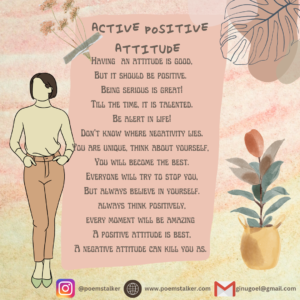
Having an attitude is good,
But it should be positive.
Being serious is great!
Till the time, it is talented.
Be alert in life!
Don’t know where negativity lies.
You are unique, think about yourself,
You will become the best.
Everyone will try to stop you,
But always believe in yourself.
always think positively,
every moment will be amazing
A positive attitude is best,
A negative attitude can kill you as.
ASPIRE PERSON

Do something in life,
Study or be alive.
We are all around the world.
Probably, think or fight.
Be positive; that’s fine.
That makes this life right.
Be available for everyone,
The time that rewinds
Do everything that you want,
Be amazing person in all.
To be the best is everyone’s choice,
But respectful attribute is our dice.
The life is only with great dimensions,
It can harm you or make you mention
FACTS ABOUT ENGLISH POETRY
Here are some interesting facts about English poetry:
- Old English Poetry: English poetry has a long history, dating back to Old English poetry, which was written between the 7th and 11th centuries. Famous examples include “Beowulf” and “The Seafarer.”
- Shakespearean Sonnets: William Shakespeare, one of the most renowned English poets, wrote a series of 154 sonnets. His sonnets are known for their exploration of themes like love, time, beauty, and mortality.
- Iambic Pentameter: Iambic pentameter is a common metrical pattern in English poetry. It consists of ten syllables per line with alternating stressed and unstressed syllables. Many famous sonnets and plays by Shakespeare are written in iambic pentameter.
- Blank Verse: Blank verse is unrhymed poetry, often written in iambic pentameter. It is widely used in English drama, including Shakespearean plays like “Hamlet” and “Macbeth.”
- Romantic Poetry: The Romantic Era (late 18th to early 19th centuries) produced some of the most celebrated English poets, including William Wordsworth, Samuel Taylor Coleridge, Lord Byron, Percy Bysshe Shelley, and John Keats. They focused on emotions, nature, and individualism.
- Victorian Poetry: The Victorian Era (19th century) saw poets like Alfred Lord Tennyson, Robert Browning, and Christina Rossetti. Their poetry often dealt with issues of morality, society, and the industrial revolution.
- Modernist Poetry: The 20th century brought forth modernist poets like T.S. Eliot, Ezra Pound, and W.B. Yeats. They experimented with form and language, breaking away from traditional styles.
- Confessional Poetry: In the mid-20th century, poets like Sylvia Plath and Anne Sexton pioneered confessional poetry, which delved into personal, often dark, and emotionally raw subject matter.
- Beat Poetry: The Beat Generation, including poets like Allen Ginsberg and Jack Kerouac, rebelled against societal norms and advocated for individual freedom and expression in their poetry.
- Contemporary Poetry: Contemporary English poetry is incredibly diverse, with poets exploring a wide range of themes, forms, and styles. It continues to evolve and adapt to the changing times.
- National Poetry Month: In the United States, April is celebrated as National Poetry Month, dedicated to promoting the reading, writing, and appreciation of poetry.
- Poetry Awards: Prestigious poetry awards include the Nobel Prize in Literature, the Pulitzer Prize for Poetry, and the T.S. Eliot Prize.
- Spoken Word Poetry: In recent years, spoken word poetry has gained popularity, with poets performing their work in live events, often addressing social and political issues.
- Online Poetry Communities: The internet has enabled the growth of online poetry communities, where poets can share their work through blogs, social media, and dedicated platforms.
- Translation: Many classic English poems have been translated into numerous languages, making them accessible to a global audience.
English poetry is a vibrant and evolving art form with a rich history and a diverse array of voices and styles. It continues to captivate and inspire readers and poets around the world.
Light-hearted facts about English poetry
- Limericks: Limericks are a form of humorous poetry that often feature silly or absurd subject matter. They have five lines and a distinctive AABBA rhyme scheme. They are known for their playful and sometimes nonsensical nature.
- Edward Lear’s Nonsense Poetry: Edward Lear, an English artist and writer, is famous for his “nonsense” poetry, including “The Owl and the Pussycat.” His poems often feature whimsical characters and absurd scenarios.
- Ogden Nash’s Rhyming Wit: Ogden Nash was known for his clever and humorous use of rhyme. His poems often included puns and wordplay that brought smiles to readers’ faces.
- Shel Silverstein’s Children’s Poetry: Shel Silverstein’s children’s poems are beloved for their zany humor and whimsical illustrations. Classics like “Where the Sidewalk Ends” and “A Light in the Attic” continue to entertain young readers.
- Ode to My Socks: The famous Chilean poet Pablo Neruda wrote a poem titled “Ode to My Socks,” where he humorously describes the joy of receiving a pair of hand-knitted socks as a gift.
- The Jumblies: Edward Lear’s poem “The Jumblies” is about a group of adventurous individuals who set out in a sieve to explore the world. The absurdity of their journey adds a touch of humor.
- Nonsensical Jabberwocky: Lewis Carroll’s poem “Jabberwocky” from “Alice Through the Looking-Glass” is known for its invented words and whimsical language. It’s a playful example of how poetry can create its own reality.
- Comic Epitaphs: Some humorous epitaphs in English poetry are designed to make people chuckle even in the graveyard. For example, “I told you I was sick” is a cheeky epitaph found on a tombstone.
- Haiku for Breakfast: Some poets have fun by composing haikus about everyday activities. For instance, “Coffee steam rises, / Morning sun through kitchen blinds, / My day begins, smiles.”
- Parodies: Poets have often created parodies of famous poems to add humor. These parodies playfully imitate the style and themes of the original works while adding a comedic twist.
- Ode to the Potato: There’s a humorous poem titled “Ode to the Potato” by the Irish poet John Betjeman, where he celebrates the versatility of the potato in various culinary forms.
- Puns in Poetry: Some poets use puns liberally in their poems, adding a layer of humor for those who catch the wordplay. Puns can range from clever to downright silly.
While poetry often explores serious themes and emotions, it also has a playful and humorous side that can bring joy and laughter to readers. These funny facts about English poetry showcase the diversity of expression within the art form.
ENGLISH POEM
English poetry is a diverse and rich literary tradition that spans centuries and encompasses a wide range of styles, themes, and forms. Here’s an overview of some key aspects of English poetry:
- Language and Expression: English poetry is characterized by its use of the English language to convey emotions, thoughts, stories, and ideas. Poets use words, metaphors, and imagery to create a unique and often profound artistic expression.
- Form and Structure: English poems come in various forms and structures. Common forms include sonnets, haikus, ballads, and free verse. These forms have specific rules regarding rhyme, meter, and stanza arrangement.
- Rhyme and Meter: Many English poems use rhyme, where words at the end of lines have similar sounds. Meter refers to the rhythmic pattern of stressed and unstressed syllables in a line. Iambic pentameter, trochaic tetrameter, and anapestic trimeter are examples of poetic meters.
- Themes: English poets explore a wide range of themes in their works. Common themes include love, nature, mortality, beauty, social issues, politics, and human emotions. The choice of theme often reflects the poet’s perspective and the era in which they lived.
- Famous Poets: English poetry has produced numerous renowned poets throughout history. Some of the most celebrated English-language poets include William Shakespeare, William Wordsworth, Emily Dickinson, Robert Frost, Langston Hughes, Maya Angelou, and many more.
- Literary Movements: English poetry has evolved through various literary movements and periods, each with its unique characteristics and poets. Examples include the Romantic Era, Victorian Era, Modernist Movement, and Contemporary Poetry.
- Imagery and Figurative Language: Poets often use vivid imagery and figurative language, such as similes, metaphors, personification, and symbolism, to create a sensory and emotional impact on the reader.
- Performance Poetry: Some forms of English poetry, such as spoken word and slam poetry, are meant to be performed. These poems often address contemporary issues and engage the audience with their spoken delivery.
- Influence on Literature: English poetry has had a significant influence on other forms of literature, including novels, plays, and short stories. Many classic works of English literature incorporate poetic elements and styles.
- Poetry Awards: Prestigious awards, such as the Pulitzer Prize for Poetry and the T.S. Eliot Prize, recognize outstanding contributions to the field of English poetry.
- Online Poetry Communities: The internet has provided a platform for poets to share their work with a global audience through blogs, social media, and poetry-sharing websites.
- Poetry Appreciation: English poetry continues to be studied and appreciated in educational settings, and it plays a vital role in preserving cultural and historical narratives.
English poetry is a dynamic and enduring art form that reflects the creativity, emotions, and perspectives of poets from diverse backgrounds and eras. It continues to evolve, adapt, and inspire readers and writers worldwide.
MOST TOP ENGLISH POEM NAMES
There are countless famous and celebrated English poems, and the “top” ones can vary depending on personal preferences and literary opinions. However, here are some of the most well-known and highly regarded English poems:
- “To be or not to be” (from “Hamlet”) by William Shakespeare – This soliloquy is one of the most famous in the English language, exploring the themes of life, death, and existentialism.
- “The Road Not Taken” by Robert Frost – A reflective poem about choices and the paths we take in life.
- “The Raven” by Edgar Allan Poe – A dark and mysterious narrative poem featuring a talking raven.
- “Do Not Go Gentle into That Good Night” by Dylan Thomas – A villanelle that passionately urges resistance against death and aging.
- “I Wandered Lonely as a Cloud” (also known as “Daffodils”) by William Wordsworth – A poem celebrating the beauty of nature and the lasting impact of a field of daffodils.
- “The Waste Land” by T.S. Eliot – A modernist masterpiece that explores the disillusionment and fragmentation of the modern world.
- “Howl” by Allen Ginsberg – A seminal work of Beat Generation poetry, known for its raw and unfiltered portrayal of post-war America.
- “Ozymandias” by Percy Bysshe Shelley – A sonnet that reflects on the impermanence of human achievements and power.
- “Dulce et Decorum Est” by Wilfred Owen – A powerful anti-war poem that vividly describes the horrors of World War I.
- “If—” by Rudyard Kipling – A poem offering guidance on how to navigate life’s challenges and obstacles with resilience and wisdom.
- “The Love Song of J. Alfred Prufrock” by T.S. Eliot – A dramatic monologue that delves into the inner thoughts and anxieties of its speaker.
- “The Tyger” (from “Songs of Experience”) by William Blake – A poem that questions the nature of creation and the existence of evil.
- “Annabel Lee” by Edgar Allan Poe – A romantic and tragic poem about love and death.
- “Ode to a Nightingale” by John Keats – An ode that explores the themes of mortality, art, and the longing for an idealized existence.
- “To Autumn” by John Keats – A celebration of the beauty and bounty of the autumn season.
These are just a few examples of the many exceptional English poems that have left a lasting impact on literature and culture. Different people may have their own personal favorites, and the significance of a poem can vary greatly depending on individual experiences and perspectives.
- WANT TO KNOW ABOUT CARTOON THAN CLICK HERE
ENGLISH POEM ENGLISH POEM ENGLISH POEM ENGLISH POEM ENGLISH POEM ENGLISH POEM ENGLISH POEM ENGLISH POEM ENGLISH POEM ENGLISH POEM ENGLISH POEM ENGLISH POEM ENGLISH POEM ENGLISH POEM ENGLISH POEM ENGLISH POEM
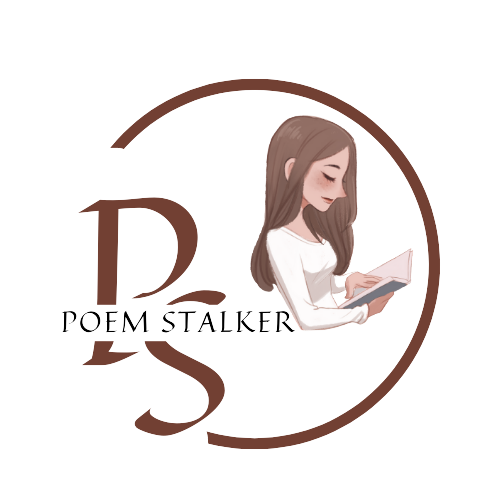
1: Eat St. app. Want to access games instantly
on cellular through a trusted, 100% protected and youngster-friendly app with no in-sport
purchases? For the benefit of the cricket enjoying fraternity, eleven wickets provide
app (both android and iOS) and web site versions appropriate for all sorts of software program.
Pay notice for an additional awesome characteristic that helps creating your own ranges and playing
different users levels. The core scripting language is ECMAScript, giving users access to all
primary ECMAScript language features equivalent to circulation management, variables string manipulation and so on.
The general public slots in the class StelMainScriptAPI are
available by way of an object named core. It was
comically named after cartoon character Wile E. Coyote, who routinely had issues with the laws
of physics while trying to catch the Road Runner.
Packers climb their way to Super Bowl from wild card
match whereas the Steelers enjoys a primary bye-week
in the playoffs. If you would like an HDMI port, Tv tuner or other video
part, ensure that the video card or cards you’ve chosen embrace them.
You will need to also decide how a lot Gold you want to purchase.
If this is the case, you’ll be taken to an extra mini-recreation, the place it’s essential to select from 12 coins.
Players must land at one Fu Bat symbol to stand an opportunity to win a jackpot, but for those who land extra,
you may be eligible for multiple jackpots. During this spherical, one symbol is randomly chosen to change into an increasing
symbol, which may lead to even bigger payouts. You don’t must pay
and even obtain anything. The outcomes are finally
out, Pittsburgh Steelers and Green Pay Packers will go on to play in the Super Bowl XLV Finals in Texas,
Arlington on the 6th of Feb 2011. Packers defeated the Chicago Bears 21-14 in the NFC Championship recreation and the Steelers beat the Jets 24-19 in the AFC Championship recreation yesterday.
RAJAWIN – https://rajawin.fun
I like the articles being all in one